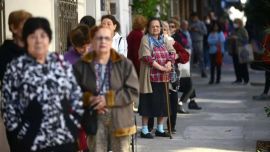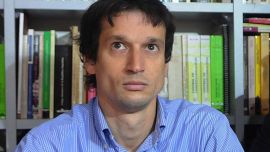According to a new report by the Instituto Argentino de Análisis Fiscal (IARAF), in its first full month in office, President Javier Milei’s government recorded the biggest interannual public spending cuts of the last 30 years in Argentina. The fiscal surplus recorded in January – the country’s first in 12 years – is basically explained by those cuts. And the sector most “contributing” to this result were pensioners, representing 33 percent of that effort.
“The total saved was 2.7 trillion pesos with the biggest spending reductions coming in pensions (down 885.074 billion pesos), energy subsidies (down 366.451 billion), direct real investment (down 321.474 billion) and total transfers to provinces (down 310.781 billion). Those four items contributed 70 percent of total savings,” the IARAF explained in its report.
With this month’s update, plus a bonus of 70,000 pesos for the minimum pension, those receiving the least will collect just 200,445 pesos (around US$240). According to economist and IARAF president Nadin Argañaraz, pensioners already kicked off this year with a 17 percent loss of purchasing-power as against last December. In the last few years the plunge has been pronounced: comparing the data with figures from 2017, the loss is 57 percent for those without a bonus and 35 percent for those with access to the benefit.
“I collect a bit more than the minimum pension because I retired as a social worker and should be picking up 170,000 pesos. I’m not getting that because I borrowed loans,” said María Dolores Merlo, 71, in an interview with Perfíl. “I live off 142,000 pesos a month.”
Despite having worked and contributed all her life, María must restrict her spending to a maximum.
“I have no chance of any extra expense without paying out of what I consume,” commented Merlo, adding: “If suddenly something needs fixing, if a pipe bursts or is blocked or the washing-machine breaks down or even if my granddaughters drop by from school to eat, I cannot make it.”
She has family who help out, but is embarrassed to ask.
“My children are helping me out but sometimes in order not not to go asking them, I draw out the next pension in advance but then things get very much more complicated. That is the reality of many pensioners. And I know that there are people who do not even have the good fortune I have of owning a house,” said María.
As a former social worker, Merlo knows the reality facing many pensioners: “If I live as restricted as I do, I cannot imagine how somebody renting out a tiny room lives, something I have seen because I used to attend many people who rented out in boarding-houses.”
Besides state trimming of money for pensioners, the chopping the subsidies for energy and transport also help to explain the historic January surplus.
“Now, increases in transport fares must be added, as has already been noted. The panorama does not favour us in any aspect, neither pensioners nor workers,” she summed up.
Over the last 10 years, according to the Catholic University of Argentina’s (UCA) Observatorio de la Deuda Social (“Social Debt Observatory), jobs with a full range of accompanying rights have not risen above 45 percent of the total of persons employed, falling to 40.3 percent in 2022. According to the latest data from the INDEC national statistics bureau, in the third quarter of 2023 35.8 percent of wage-earners were not making any pension contributions at all.
Juana González, 72, has been working since she was 14, but during her first 16 years in domestic service, no pension contributions were registered.
“Afterwards I was working for 12 years as office staff and making pension contributions but they chucked me out after an operation for cancer and radiation treatment reduced my productivity so I went home to work as a seamstress,” she explained.
Since the number of years with contributions were not enough to retire, “I’m one of so many pensioners who entered the moratoria,” she explains.
In a country where unregistered work is the norm, “many of us [who live] pensioned off in these conditions are worried because they say they’re going to review whether the benefits we collect correspond to us or not,” she added.
Despite being a pensioner, González continues to work. “Honestly, I’m only just making it. For now I don’t want to ask for help from my children because they also have families and all three have to pay rent. But I cannot indulge myself in anything extra, I cannot buy a kilo of ice cream to stick in the refrigerator and eat little-by-little. The situation is difficult for everybody, I‘m already old enough but I’m worried about the young.”
Geography teacher Ignacio Iturrioz, 24, said: “Salaries have lost out big time to inflation. Tandil, which is where I live, had the highest inflation nationwide with 44.3 percent in December. As a teacher I had applied for a CONICET [science and research council] scholarship but, besides more than halving them [the amount available], they have also heavily reduced the science budget so that some of what was going to be my work this year is now in doubt.”
Transport costs also influenced the deterioration of purchasing-power.
“I have no car of my own and often depend on public transport so from here on I’m using the bicycle much more,” said Iturrioz.
Transport subsidies were cut in January by 17 percent as against the same month in 2023, which also represented the lowest real expense in the last nine years, according to Argañaraz. The education budget was also reduced – transfers to national universities suffered a real fall of 31 percent inter-annually.
Zulema Orlando, 68, gained access to her pension as a housewife, taking out several loans to reach the end of the month.
“Beforehand I made handicrafts for sale and got by but now things are so expensive that people no longer want to buy them. I go managing my expenditures day-by-day, you go shopping and when you see the prices, you don’t know what to do.,” she told Perfíl.
I have a handicapped daughter who collects a pension and we get by on that. With her pension we pay for some things and also the medicines which she needs. I hope that the March increase is decent enough to buy our food this month,” she commented to Perfíl.
Up until February the minimum pension was 105,000 pesos with the extra compensation of a bonus of 55,000 pesos.























Comments